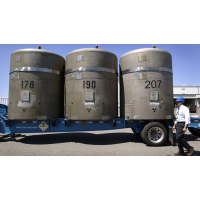They’re Injecting Fracking Waste into Shale; Is Nuclear Waste Next?
 Nuclear waste-filled cannisters headed to New Mexico (photo: Jeff T. Green, Getty Images)
Nuclear waste-filled cannisters headed to New Mexico (photo: Jeff T. Green, Getty Images)
Underground deposits of rock known as shale have been a boom to the oil and gas industry ever since experts figured out that injecting a cocktail of water and hazardous chemicals into the earth could release vast, untapped stores of natural gas.
The biggest controversies related to this procedure, known as hydraulic fracturing, or “fracking,” have to do not with the drilling itself, but with the injection of wastewater back into the earth. These injection wells are thought to have caused earthquakes and groundwater contamination.
Now, a geologist is proposing that a way to solve the United States’ problem of nuclear waste is to inject it, as well, into shale formations.
Chris Neuzil with the U.S. Geological Survey, who has conducted research in Canada on disposing nuclear waste underground, told a leading chemical conference that shale should be considered an option for getting rid of the estimated 77,000 tons of spent nuclear fuel currently housed at various power plants and storage sites around the country.
Neuzil pointed out that since the federal government abandoned its plan to permanently store nuclear waste in Nevada’s Yucca Mountain, there is no long-term alternative being developed for this critical environmental issue.
Instead, the waste is being stored above ground in temporary facilities, which is risky given the maintenance and security necessary to protect it, the potential for Fukushima-type natural disasters, and that it could take hundreds of thousands of years for the radioactive material to stop being dangerous.
“Hoping for stable societies that can continue to provide those things for millennia is not a good idea,” he said this week at the American Chemical Society’s 247th National Meeting & Exposition in Dallas, Texas.
So why not use shale deposits, he told his audience, considering the sedimentary rock’s natural, nearly impermeable nature.
After all, France, Switzerland and Belgium are planning to use shale repositories to store nuclear waste, he said. Neuzil has been doing his own research in Ontario with the Canadian Nuclear Waste Management Organization to determine if the shale there could work for this purpose.
As has occurred with fracking operations, experts believe that ground water contamination by buried nuclear waste is one of the biggest risks. Neuzil believes this is not likely, explaining that water moves slowly through shale, which he said is fairly water tight.
However, as Neuzil himself has conceded, a danger exists of disturbing nuclear waste-injected shale by companies drilling for oil or natural gas in the future. For that reason, he suggests that the deposit sites be carefully chosen.
-Noel Brinkerhoff
To Learn More:
Shale May Offer Long-Term Home For Nuclear Waste (Homeland Security News Wire)
Shale Could Be Long-Term Home for Problematic Nuclear Waste (American Chemical Society)
What Should We Do with America’s Nuclear Waste? (by Noel Brinkerhoff, AllGov)
- Top Stories
- Unusual News
- Where is the Money Going?
- Controversies
- U.S. and the World
- Appointments and Resignations
- Latest News
- Musk and Trump Fire Members of Congress
- Trump Calls for Violent Street Demonstrations Against Himself
- Trump Changes Name of Republican Party
- The 2024 Election By the Numbers
- Bashar al-Assad—The Fall of a Rabid AntiSemite






Comments